Introduction
Hey there, rabbit owners and enthusiasts! Are you constantly on the lookout for new ways to keep your fluffy pals happy and healthy?
As someone who’s obsessed with their rabbits’ well-being, I’ve done my fair share of research into finding the best foods to keep them thriving. And, Napa cabbage is a game-changer!
we’re going to dig deep into the nutritional benefits of Napa cabbage for rabbits. We’ll explore the vitamins and minerals that make this veggie a powerhouse, including vitamin A, C, and K, calcium, and potassium.
But hey, we won’t stop there. We’ll also dive into the potential risks and precautions you need to be aware of when feeding Napa cabbage to your furry friends.
And of course, we’ll give you some handy tips on how to incorporate Napa cabbage into your rabbits’ diet. Whether it’s fresh leaves, a tasty salad, or even stuffed chew toys, we’ll show you how to make mealtime exciting, nutritious, and oh-so-enjoyable for your little hoppy buddies.
So, grab a cup of tea, snuggle up with your bunnies, and get ready to learn all about the amazing benefits and precautions of feeding Napa cabbage to your furry friends. Trust me, your bunnies will be forever grateful for the nourishing treats you’ll provide!
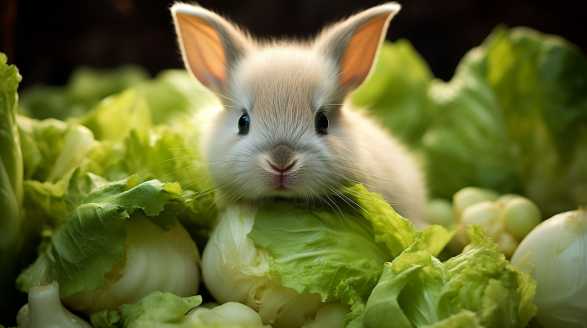
Key Takeaways
- Napa cabbage is a nutritious vegetable that offers several health benefits for rabbits.
- It is rich in essential vitamins and minerals like vitamin A, C, and K, calcium, and potassium.
- Napa cabbage promotes digestive health, supports weight management, and boosts the immune system in rabbits.
- However, it’s important to introduce Napa cabbage gradually and in moderation to avoid digestive issues.
- Potential risks include gas and bloating, diarrhea, calcium imbalances, oxalate content, and allergic reactions.
- Precautions include serving in moderation, offering a balanced diet, observing for digestive issues, and washing and preparing it properly.
- Rabbits can be allergic to Napa cabbage, so it’s important to monitor their reactions and consult with a veterinarian if needed.
- Napa cabbage can be incorporated into a rabbit’s diet through fresh leaves, salads, wraps, blanching, or as stuffed chew toys.
- Variety in a rabbit’s diet is essential to ensure they receive a balanced intake of nutrients.
- Other safe vegetables to feed rabbits include romaine lettuce, carrots, bell peppers, spinach, and kale.
- The well-being of rabbits depends on providing a diverse and nutritious diet, making Napa cabbage a great addition to their meals.
The Nutritional Benefits of Napa Cabbage for Rabbits
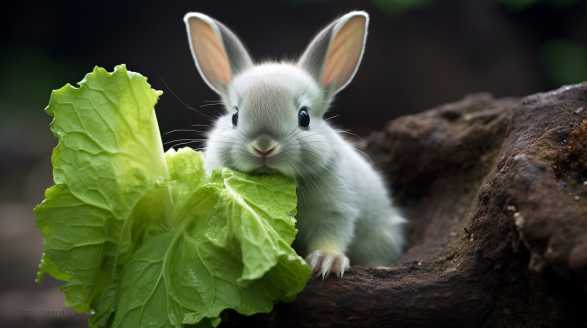
Raising rabbits as pets or for farming purposes requires a well-balanced diet to ensure their overall health and well-being. As an avid rabbit owner, I have always been curious about the best vegetables to include in their diet.
I will explore the amazing health advantages that Napa cabbage brings to rabbits.
What is Napa Cabbage?
Napa cabbage, scientifically known as Brassica rapa subsp. pekinensis, is a type of cabbage commonly used in East Asian cuisine.
High in Essential Nutrients
When it comes to ensuring your rabbits receive the necessary nutrients for optimal health, Napa cabbage stands out. This vegetable is rich in several essential vitamins and minerals required for proper rabbit growth and development.
- Vitamin A: Napa cabbage contains high levels of vitamin A, which plays a crucial role in maintaining healthy vision, boosting immune function, and promoting overall growth and development in rabbits.
- Vitamin C: This cabbage variety is an excellent source of vitamin C, a potent antioxidant that aids in tissue repair, collagen production, and immunity enhancement for rabbits.
- Vitamin K: Napa cabbage is packed with vitamin K, which aids in blood clotting, bone health, and preventing bleeding disorders in rabbits.
- Calcium: Maintaining strong bones and teeth is vital for rabbits, and Napa cabbage provides ample amounts of calcium, aiding in their skeletal development.
- Potassium: With its high potassium content, Napa cabbage helps regulate fluid balance, muscle contractions, and nerve function in rabbits.
Promotes Digestive Health
A rabbit’s digestive system is delicate and needs constant care. Napa cabbage serves as an excellent addition to their diet, supporting optimal digestive health.
- Fiber: Napa cabbage is rich in dietary fiber, which aids in maintaining healthy digestion and preventing gastrointestinal issues in rabbits.
- Hydration: This vegetable has a high water content, which helps rabbits stay hydrated, promoting healthy digestion and preventing constipation.
Supports Weight Management
Weight management is vital for rabbits, as obesity can lead to various health issues. Napa cabbage helps maintain a healthy weight for your furry friends in the following ways:
- Low-Calorie: Napa cabbage is a low-calorie food, making it an ideal option for rabbits on a weight management plan.
- High Water Content: Due to its high water content, Napa cabbage can assist in creating a feeling of fullness and reducing the risk of overeating in rabbits.
Boosts Immune System
A robust immune system is crucial for rabbits to fight off infections and diseases. By including Napa cabbage in their diet, you can enhance their immune response and overall well-being through the following mechanisms:
- Antioxidants: Napa cabbage contains antioxidants that protect rabbits’ cells from damage caused by harmful free radicals, boosting their immune system.
- Vitamin C: The high levels of vitamin C in Napa cabbage provide an immune system boost, aiding in disease prevention and overall health for rabbits.
Feeding Napa Cabbage to Rabbits
While Napa cabbage offers incredible nutritional benefits to rabbits, it is essential to introduce it gradually and in moderation. Here are some guidelines to keep in mind when feeding Napa cabbage to rabbits:
- Introduce Gradually: Start by offering small pieces of Napa cabbage and gradually increase the amount over time. This allows their digestive system to adjust and prevents digestive upset.
- Moderation is Key: While Napa cabbage is nutritious, it should be offered alongside a balanced diet that includes hay, fresh water, and other rabbit-friendly vegetables. Limit the serving size to one or two leaves per rabbit per day.
- Fresh and Organic: Opt for fresh, organic Napa cabbage to avoid exposure to pesticides or chemicals that could be harmful to your rabbits.
- Remove the Core: Before feeding Napa cabbage to rabbits, remove the tough core as it may pose a choking hazard.
Incorporating Napa cabbage into your rabbit’s diet can provide numerous nutritional benefits, promoting their overall health and well-being. Its rich nutrient profile, digestive support, weight management assistance, and immune system boost make it an ideal vegetable to include in their meals.
By following these guidelines, you can ensure your rabbits reap the nutritional advantages of Napa cabbage while keeping them happy and healthy. So, why not give it a try and see the positive impact it brings to your favorite furry companions?
Potential Risks and Precautions of Feeding Napa Cabbage to Rabbits
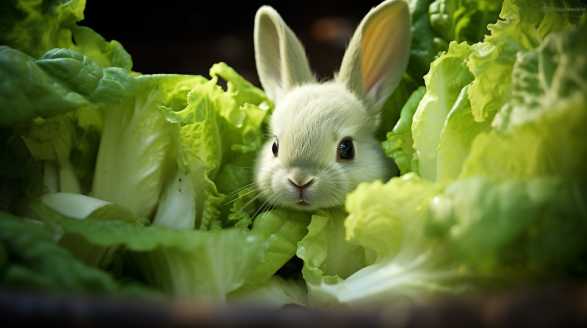
As a rabbit owner, I am always looking for new and healthy food options to diversify my pet’s diet. One vegetable that often catches my eye is Napa cabbage.
However, through my research and personal experience, I have come across some potential risks and precautions associated with feeding Napa cabbage to rabbits. I will outline these factors to ensure the well-being of your furry friend.
The Nutritional Value of Napa Cabbage
Before delving into the potential risks, let’s first explore the nutritional benefits of Napa cabbage. This will help us understand why it may be tempting to feed it to our rabbits in the first place.
Napa cabbage is packed with essential vitamins and minerals that can contribute to your bunny’s overall health. It is an excellent source of vitamin C, which supports the immune system and aids in collagen production.
This mix of nutrients can potentially provide nutritional value for rabbits.
The Potential Risks
While Napa cabbage may seem like a healthy choice for our rabbits, certain risks need to be considered before introducing it into their diet. Here are the potential risks associated with feeding Napa cabbage to rabbits:
- Gas and Bloating: Napa cabbage contains high amounts of natural sugars and fiber, which can cause gas and bloating in rabbits, leading to discomfort and potential digestive issues.
- Diarrhea: Excessive consumption of Napa cabbage can result in loose stools and diarrhea in rabbits. This can lead to dehydration and electrolyte imbalances if not managed promptly.
- Calcium Imbalance: Although Napa cabbage is a good source of calcium, an excess of this mineral can be harmful to rabbits. Overconsumption may contribute to the formation of bladder and kidney stones, which can be painful and may require veterinary intervention.
- Oxalate Content: Napa cabbage contains moderate levels of oxalates, which can bind with calcium and form crystals. These crystals can contribute to the formation of urinary stones in rabbits.
- Allergic Reactions: Rabbits, like humans, can have allergies or sensitivities to certain foods. Introducing Napa cabbage may result in allergic reactions such as skin irritations, itching, or gastrointestinal upset. It is recommended to monitor your rabbit closely for any signs of an allergic response.
Precautions to Take
Considering the potential risks mentioned above, it is essential to take some precautions before offering Napa cabbage to your rabbit. These precautions will help minimize any adverse effects and ensure the well-being of your furry companion.
- Moderation is Key: Napa cabbage should only be given to rabbits in moderation. Limit the amount to small portions and monitor your rabbit’s response carefully. Start with a tiny quantity and gradually increase if there are no adverse reactions.
- Balanced Diet: While Napa cabbage may provide certain nutrients, it should never replace the fundamental components of a rabbit’s diet. Hay should make up the majority of their diet, followed by fresh vegetables as secondary sources of nutrition. Offer a variety of other safe vegetables to ensure a balanced diet.
- Observe for Digestive Issues: After introducing Napa cabbage, watch for any signs of digestive issues such as gas, bloating, or loose stools. If these symptoms occur, discontinue feeding Napa cabbage and consult a veterinarian if necessary.
- Prepare and Wash Thoroughly: Wash Napa cabbage leaves thoroughly before offering them to your rabbit. Remove any outer layers that may contain dirt or chemicals. Cut the cabbage into small, manageable pieces to prevent choking hazards and aid digestion.
- Offer Alternatives: To avoid potential risks associated with Napa cabbage, consider offering alternative vegetables that are known to be safe for rabbits. This can include leafy greens like romaine lettuce, kale, or cilantro. These alternatives can provide similar nutrients without the risks associated with Napa cabbage.
While Napa cabbage may seem tempting to add to your rabbit’s diet, it is crucial to be aware of the potential risks and take necessary precautions. As a responsible rabbit owner, it is essential to prioritize your pet’s health and well-being.
By understanding the nutritional value and potential risks of feeding Napa cabbage to rabbits, you can make informed decisions about your bunny’s diet. Always consult with a veterinarian before introducing any new additions to your pet’s diet.
Understanding the Quantity Limitations of Napa Cabbage in a Rabbit’s Diet
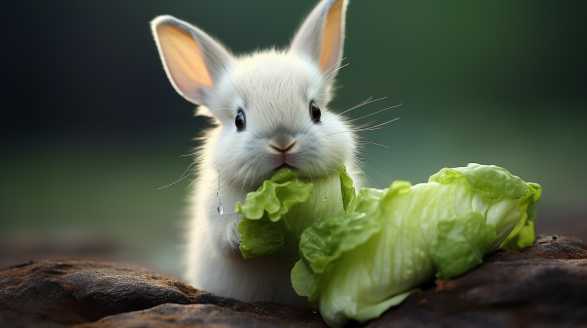
As a rabbit owner, one of the most important aspects of caring for our furry friends is ensuring they have a balanced and nutritious diet. While rabbits are known to enjoy a variety of vegetables, it is essential to understand the quantity limitations when it comes to feeding them certain foods.
Napa cabbage, also known as Chinese cabbage, is a popular leafy green vegetable that is not only enjoyed by humans but also often included in a rabbit’s diet. Its unique flavor and crunch make it an appealing choice to enhance the experience of feeding our beloved bunnies.
The Nutritional Benefits of Napa cabbage
Just like other leafy greens, napa cabbage boasts a range of nutritional benefits for rabbits. Here are some essential nutrients found in napa cabbage:
- Vitamin C – Napa cabbage is a good source of vitamin C, which plays a vital role in a rabbit’s overall health and immunity.
- Folate – This vegetable also contains folate, an essential B-vitamin that assists in cell growth and development.
- Fiber – Napa cabbage is relatively high in fiber, crucial for maintaining a healthy digestive system in rabbits.
- Calcium – While napa cabbage contains calcium, it is important to note that rabbits have specific dietary requirements for this mineral, and the high oxalate content in napa cabbage makes it less suitable as a primary calcium source.
The Quantity Dilemma: Feeding Napa Cabbage to Rabbits
Despite the nutrient benefits, napa cabbage should be fed to rabbits in moderation. Overfeeding this vegetable can lead to various health issues, including:
1. Gastrointestinal Discomfort
Rabbits have sensitive digestive systems, and sudden changes or excessive intake of any food can disrupt their delicate balance. Feeding too much napa cabbage can cause bloating, gas, and potentially lead to gastrointestinal stasis, a severe condition that requires immediate veterinary attention.
2. Calcium Imbalances
As mentioned earlier, napa cabbage contains calcium, but the high oxalate content can hinder its absorption and contribute to calcium imbalances. Rabbits need a balanced calcium-to-phosphorus ratio for optimal health.
The Rule of Thumb: Moderation is Key
When it comes to feeding napa cabbage to your rabbit, following these guidelines will help you ensure a balanced diet:
1. Quantity Control
Limit the amount of napa cabbage to small, occasional servings. Aim for no more than a few small leaves as part of a diversified diet.
2. Balanced Variety
Remember, no single vegetable should dominate a rabbit’s diet. To provide a broad range of nutrients and prevent any potential issues, it is crucial to supplement napa cabbage with other rabbit-friendly vegetables like kale, romaine lettuce, and bell peppers.
3. Observation and Adaptation
Every rabbit is unique, and their tolerance for different foods may vary. Observe your rabbit’s reactions to napa cabbage and consult with a veterinarian if you notice any abnormal behaviors, such as decreased appetite, bloating, or abnormal stools.
Napa cabbage can be a delightful addition to a rabbit’s diet, contributing to their nutrient intake and providing a flavorful experience. However, it is essential to practice moderation and ensure a balanced variety of foods to avoid any potential health complications.
By being mindful of the quantity and diversity of foods we feed our rabbits, we can ensure their overall well-being and provide them with the best care possible. Remember, a happy and healthy bunny is a well-fed bunny!
Understanding Rabbit Allergies: Can Rabbits Be Allergic to Napa Cabbage?
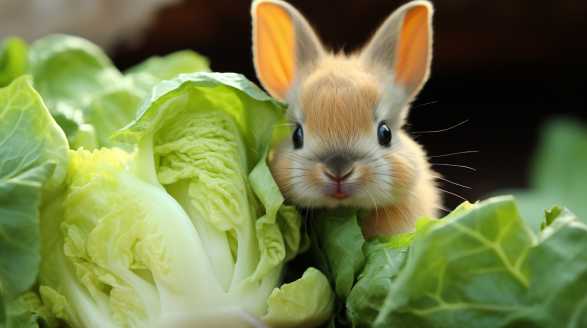
As an avid rabbit owner, I have always been curious about what I can and cannot feed my furry friend. One vegetable that often raises questions is napa cabbage.
Can rabbits be allergic to napa cabbage? Let’s dive into the topic of rabbit allergies and explore whether or not napa cabbage poses any risks for our beloved rabbits.
Understanding Rabbit Allergies
Rabbits, just like humans, can develop allergies to certain substances. These allergies can manifest in various ways, including respiratory issues, skin irritations, and even digestive problems.
Common Rabbit Allergens
Before we specifically address the question of napa cabbage allergies in rabbits, let’s take a quick look at some common allergens for these adorable creatures:
- Dust and Pollen: Just like humans, rabbits can be sensitive to dust and pollen in the environment. Ensure your rabbit’s living space is clean and free from excessive dust to prevent respiratory discomfort.
- Hay and Straw: While rabbits are typically fed hay as part of their diet, some individual rabbits may develop allergies to specific types of hay or straw. Pay attention to any signs of allergy and switch to a different variety if needed.
- Certain Grasses and Weeds: Rabbits that spend time outdoors may come into contact with grasses and weeds that can trigger allergic reactions. Monitor your rabbit’s outdoor activities to minimize exposure to potential allergens.
- Certain Foods: Although rabbits are herbivores and can eat a wide variety of vegetables, there are some foods that may cause allergies in certain individuals. This brings us to the question of whether napa cabbage can be an allergen for rabbits.
Napa Cabbage and Rabbit Allergies: The Truth Unveiled
Let’s address the million-dollar question – can rabbits be allergic to napa cabbage? The answer is yes, rabbits can be allergic to napa cabbage, just like they can be allergic to any other food.
How to Identify Allergic Reactions in Rabbits
It’s crucial to familiarize yourself with the symptoms of allergies in rabbits so that you can promptly identify and address any potential issues. Here are some signs to watch out for:
- Runny nose
- Sneezing
- Watery eyes
- Itchy skin
- Hives or rashes
- Difficulty breathing
- Digestive upset (diarrhea, vomiting)
If you notice any of these symptoms after introducing napa cabbage into your rabbit’s diet, it’s best to consult with a veterinarian and discontinue feeding it to your furry friend.
Precautions when Introducing Napa Cabbage
If you decide to feed your rabbit napa cabbage, it is recommended to introduce it gradually and monitor your rabbit closely for any signs of allergies. Follow these precautions to ensure your rabbit’s safety:
- Start with small amounts: Begin by offering a small piece of napa cabbage and observe your rabbit’s response. If there are no signs of allergy, you can gradually increase the portion size.
- Look for freshness: Choose fresh, crisp napa cabbage. Avoid wilted or spoiled leaves, as they may cause digestive upset or allergic reactions in rabbits.
- Wash thoroughly: Rinse the napa cabbage under cold water to remove any potential pesticides or dirt that could be harmful to your rabbit. Pat it dry before serving.
- Monitor your rabbit’s health: Keep a close eye on your rabbit’s behavior and overall well-being after introducing napa cabbage. If you notice any adverse reactions, discontinue feeding it immediately.
Other Rabbit-Safe Vegetables
If you’re unsure about feeding your rabbit napa cabbage or if you want to diversify their diet, here is a list of rabbit-safe vegetables that you can confidently offer:
- Carrots
- Celery
- Broccoli
- Bell peppers (in moderation)
- Spinach (in moderation)
- Cilantro
- Parsley
- Kale
- Bok choy
- Romaine lettuce (in moderation)
Remember to provide a balanced diet for your rabbit, incorporating a variety of vegetables and high-quality hay to promote their overall health and well-being.
While rabbits can indeed be allergic to napa cabbage, it is generally considered safe for them to consume in moderation. As with any new food introduction, it is important to monitor your rabbit closely for any signs of allergies or adverse reactions.
Remember, a healthy and happy rabbit is a well-fed one!
Napa Cabbage vs. Regular Cabbage: Which is Better for Rabbits?
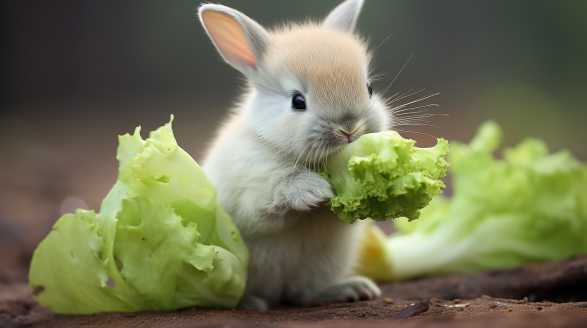
As a bunny enthusiast, I’ve always been concerned about providing the best possible diet for my furry friends. One question that often perplexed me was whether to feed them Napa cabbage or regular cabbage.
Rabbits are herbivores and require a varied diet to meet their nutritional needs. Leafy greens, such as cabbage, are an essential part of their diet.
Two popular choices are Napa cabbage, also known as Chinese cabbage, and regular cabbage.
Napa Cabbage: The Leafy Delight
Napa cabbage, with its long, crisp leaves, is a favorite among humans and rabbits alike. Here are some key reasons why Napa cabbage can be a great addition to your rabbit’s diet:
- High moisture content: Napa cabbage has a high water content, which helps keep rabbits hydrated and aids in digestion.
- Nutrient-rich: It contains essential vitamins and minerals like vitamin K, vitamin C, and potassium, that contribute to the overall health of your furry friends.
- Low-calorie option: For rabbits who may be watching their weight, Napa cabbage is a suitable choice as it is relatively low in calories.
- Mild taste: The mild taste of Napa cabbage makes it more palatable for rabbits who may be picky eaters.
Regular Cabbage: The Classic Choice
On the other hand, regular cabbage, often referred to as green cabbage, is equally nutritious and can be a beneficial addition to your rabbit’s diet. Consider the following advantages of regular cabbage:
- High fiber content: Regular cabbage is packed with fiber, which promotes healthy digestion and prevents gastrointestinal problems in rabbits.
- Rich in nutrients: It contains vitamins A, B6, and K, along with minerals like calcium and iron, ensuring your furry friend gets a well-rounded diet.
- Economic choice: Regular cabbage is widely available and generally more affordable than Napa cabbage, making it a cost-effective choice for feeding multiple rabbits.
Factors to Consider
While both Napa cabbage and regular cabbage have their merits, there are a few factors you should consider before making a decision. These include:
- Rabbit’s health: Some rabbits have specific dietary needs or health conditions that might influence their tolerance towards certain types of cabbage. Always consult with a veterinarian before introducing new foods.
- Digestive sensitivity: Rabbits, especially those prone to digestive issues, may find it easier to tolerate Napa cabbage due to its higher moisture content and milder taste.
- Availability: Depending on your location, either Napa cabbage or regular cabbage may be more readily accessible. Consider what is easily obtainable and affordable for your situation.
Feeding Guidelines
When introducing cabbage, whether Napa or regular, into your rabbit’s diet, it is essential to do so gradually to prevent stomach upset. Follow these guidelines for a safe and healthy transition:
- Start with small portions: Begin by offering a few small, bite-sized pieces of cabbage, observing your rabbit’s response.
- Gradually increase quantity: Slowly increase the amount of cabbage over several days, monitoring your rabbit for any signs of digestive discomfort.
- Monitor stool quality: Pay attention to your rabbit’s fecal pellets during the transition. Loose stools may indicate that the cabbage is not being tolerated well and should be reduced or discontinued.
In the eternal debate of Napa cabbage versus regular cabbage for rabbits, there is no definitive winner. Both varieties offer valuable nutritional benefits and can be a healthy addition to your rabbit’s diet.
Remember, each rabbit is unique, and it is essential to monitor their response to any new food. Always consult with a veterinarian for personalized advice to ensure your bunny leads a happy and healthy life.
The Importance of Variety in a Rabbit’s Diet: Adding Napa Cabbage
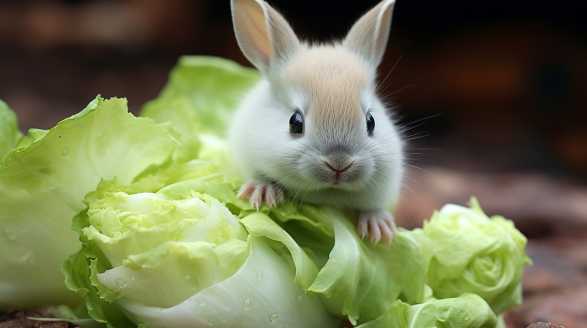
I have always been fascinated by rabbits. Their adorable floppy ears, fluffy tails, and gentle nature make them wonderful pets.
One particular vegetable that I have found to be beneficial for rabbits is Napa cabbage. I will explain why it is crucial to introduce variety into a rabbit’s diet, the benefits of Napa cabbage, and how to incorporate it into their meals.
Why Variety Matters in a Rabbit’s Diet
As herbivores, rabbits have unique dietary needs. In the wild, they would consume a wide range of plants, grasses, and vegetables to meet their nutritional requirements.
This is where owners play a crucial role in providing a balanced and varied diet.
Introducing different types of vegetables into a rabbit’s diet not only prevents boredom but also provides them with a wider range of essential vitamins and minerals. By offering various vegetables, hay, and other plant-based foods, you can ensure that your rabbit receives all the necessary nutrients to support their overall wellbeing.
Benefits of Napa Cabbage for Rabbits
Napa cabbage, also known as Chinese cabbage, is a versatile and nutritious vegetable that can be a valuable addition to a rabbit’s diet. Here are some of the benefits it offers:
- High water content: Napa cabbage is rich in water, making it a hydrating choice for rabbits, especially during hot summer months.
- Fiber source: Rabbits require a high-fiber diet to maintain their digestive health. Napa cabbage is a good source of fiber, aiding in digestion and preventing issues such as gastrointestinal stasis.
- Low in calories: For rabbits that need to watch their weight, Napa cabbage serves as a low-calorie option while still providing essential nutrients.
- Rich in vitamins and minerals: Napa cabbage contains vitamins A, C, and K, as well as potassium, calcium, and iron. These nutrients contribute to various aspects of a rabbit’s health, from immune function to bone strength.
Incorporating Napa Cabbage into Your Rabbit’s Meals
Now that we understand the importance of variety and the benefits of Napa cabbage, let’s explore how to safely introduce this vegetable into your rabbit’s diet:
- Start small: When introducing any new food to your rabbit, it’s essential to start with small quantities and gradually increase the serving size over time. This allows their digestive system to adjust to the new food and reduces the risk of gastrointestinal upset.
- Wash thoroughly: Ensure that you wash the Napa cabbage thoroughly to remove any dirt, pesticide residue, or potential toxins that may be present on the leaves.
- Chop into manageable pieces: Rabbits have delicate jaws, so it’s important to chop the Napa cabbage leaves into bite-sized pieces. This not only makes it easier for them to eat but also minimizes the risk of choking.
- Monitor your rabbit’s response: Pay close attention to how your rabbit reacts to Napa cabbage. Some individuals may have sensitivities or allergies to certain vegetables, so it’s crucial to observe any signs of discomfort or digestive issues.
Other Vegetables to Add to Your Rabbit’s Diet
While Napa cabbage is a fantastic addition to a rabbit’s diet, it’s crucial to offer a variety of vegetables to ensure a balanced nutritional intake. Here are some other safe vegetables to consider:
- Romaine lettuce
- Carrots (in moderation due to their high sugar content)
- Bell peppers
- Zucchini
- Cilantro
- Radish greens
Remember to introduce new vegetables slowly, one at a time, and monitor your rabbit’s response to identify any potential allergies or digestive issues.
Providing a diverse and nutritious diet for your rabbit is essential for their overall health and wellbeing. By adding vegetables like Napa cabbage to their meals, you are offering them a variety of flavors, textures, and nutrients.
With a varied diet, your rabbit will thrive and lead a happy, healthy life.
Different Ways to Incorporate Napa Cabbage into Your Rabbit’s Diet
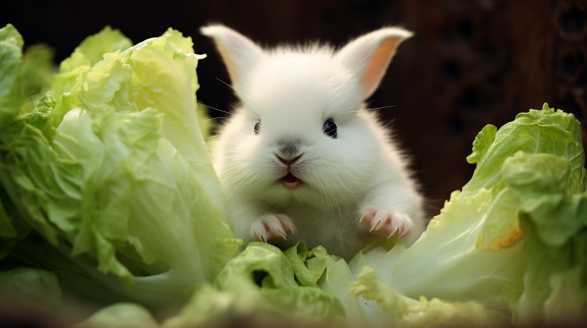
As a passionate rabbit owner, I understand the importance of providing a balanced and nutritious diet for our furry friends. While many fruits and vegetables are suitable for rabbits, one specific vegetable that stands out is Napa cabbage.
I aim to explore different ways to incorporate Napa cabbage into your rabbit’s diet, ensuring they receive the nutrition they need to thrive.
Why Napa Cabbage is Great for Rabbits
Before we dive into the various ways to include Napa cabbage in your rabbit’s diet, let’s understand why it is an excellent choice for them.
- Rich in Nutrients: Napa cabbage is packed with essential vitamins like A, C, and K, as well as minerals such as calcium and potassium. These nutrients promote optimal health for your rabbit.
- Hydration: Napa cabbage has a high water content, helping keep your rabbit hydrated, especially during hot weather or when they have gastrointestinal issues.
- Low in Calories and Sugar: Napa cabbage is low in calories, making it a great addition to your rabbit’s diet without the worry of excess weight gain. Moreover, it has minimal sugar content, reducing the risk of dental problems.
Now let’s explore the different ways you can introduce this delightful vegetable into your rabbit’s meals.
1. Fresh Napa Cabbage Leaves
The simplest and most natural way to offer Napa cabbage to your rabbit is through fresh leaves. Follow these steps to ensure your rabbit enjoys their meal:
- Wash the Napa cabbage thoroughly to remove any dirt or pesticide residue.
- Tear the leaves into bite-sized pieces, making it easier for your rabbit to eat.
- Remove the harder core areas, as they can be difficult for your rabbit to chew.
- Serve a small portion initially to see if your rabbit enjoys it, and gradually increase the amount if they show interest.
2. Napa Cabbage Salad
Another exciting way to incorporate Napa cabbage is by preparing a refreshing salad for your rabbit. Here’s a simple recipe to create a delectable and nutritious treat:
Ingredients:
- Fresh Napa cabbage leaves (washed and chopped)
- A few pieces of fresh parsley (chopped for added flavor)
- A small handful of fresh dandelion leaves (washed and torn)
- Fresh mint leaves (chopped; optional)
Instructions:
- Mix all the ingredients in a bowl, ensuring they are well combined.
- Serve the salad in your rabbit’s feeding bowl, and watch them enjoy the flavors and textures.
- Remember to provide a suitable portion size based on your rabbit’s size and dietary needs.
3. Napa Cabbage Wraps
For a fun and interactive mealtime experience, you can create Napa cabbage wraps for your rabbit. Follow these steps to prepare this enticing dish:
Ingredients:
- Fresh Napa cabbage leaves (washed and separated)
- A small serving of hay or your rabbit’s favorite greens
- A pinch of grated carrot or apple (optional)
Instructions:
- Gently steam the Napa cabbage leaves to soften them, ensuring they are still firm enough to hold their shape.
- Once cooled, place a small portion of hay or greens at the center of each leaf.
- If desired, sprinkle a pinch of grated carrot or apple on top for added variety.
- Fold the sides of the leaf over the filling, creating a wrap-like shape.
- Serve the Napa cabbage wraps to your rabbit and observe them nibble away happily.
4. Blanched Napa Cabbage
If your rabbit prefers cooked vegetables, blanching Napa cabbage can be a great option. Here’s how you can prepare it:
Instructions:
- Bring a pot of water to a boil.
- Immerse the Napa cabbage leaves in the boiling water for about 1 minute.
- Remove the leaves and rinse them under cold water to halt the cooking process.
- Offer the blanched Napa cabbage to your rabbit, making sure it has cooled down completely.
5. Napa Cabbage Stuffed Chew Toys
For a playful twist on mealtime, you can create stuffed chew toys using Napa cabbage. This not only provides mental stimulation but also encourages your rabbit to interact with their food.
Instructions:
- Take a clean, untreated wooden toy or a suitable chewable toy that can be safely stuffed.
- Carefully stuff the toy with small pieces of Napa cabbage, ensuring they are secure enough to withstand your rabbit’s chewing.
- Present the stuffed toy to your rabbit and observe them enjoy their meal in a fun and engaging manner.
Incorporating Napa cabbage into your rabbit’s diet adds flavor, nutrition, and variety to their meals. From fresh leaves to stuffed chew toys, there are several ways to introduce this leafy green into your rabbit’s routine.
With these creative ideas, you can provide your rabbit with a healthy and enjoyable dining experience every day.
Napa Cabbage as a Safe and Healthy Snack for Rabbits
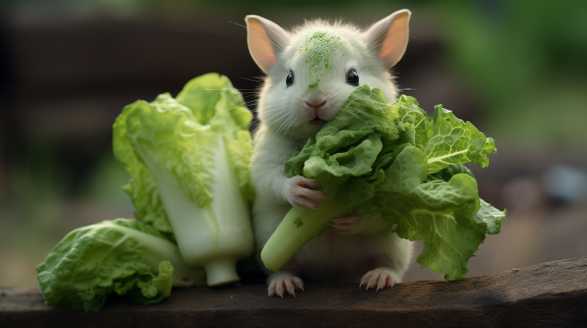
Are you a rabbit owner looking for a safe and healthy snack option for your furry friend? Look no further than Napa cabbage!
I will discuss the benefits of feeding Napa cabbage to rabbits, provide some tips for incorporating it into their diet, and share a few precautions to keep in mind.
Why Napa Cabbage?
Napa cabbage, also known as Chinese cabbage or celery cabbage, is a type of leafy vegetable that is packed with essential nutrients and fiber. It is renowned for its crisp texture and mildly sweet flavor, making it a delightful addition to your rabbit’s diet.
- Low in calories: Napa cabbage is a low-calorie vegetable, which means your rabbit can enjoy it without the risk of gaining excess weight.
- High in vitamins: This leafy green is a rich source of vitamins A, C, and K, all of which are essential for maintaining your rabbit’s overall health and well-being.
- Rich in fiber: Fiber is crucial for a rabbit’s digestive health, and Napa cabbage provides a good amount of it. Including Napa cabbage in your rabbit’s diet can prevent digestive issues such as gastrointestinal stasis.
- Hydration: Napa cabbage has a high water content, helping to keep your rabbit hydrated and promote a healthy urinary system.
Incorporating Napa Cabbage into Your Rabbit’s Diet
Now that we understand the benefits of Napa cabbage, let’s talk about how to incorporate it into your rabbit’s diet. Here are a few tips to keep in mind:
1. Introduce Napa cabbage gradually
When introducing any new food to your rabbit’s diet, it’s essential to do so gradually. Start by offering a small amount of Napa cabbage and observe how your rabbit reacts to it.
2. Wash thoroughly
Before feeding Napa cabbage to your rabbit, make sure to wash it thoroughly to remove any dirt or pesticides. This will help ensure your furry friend’s safety and well-being.
3. Cut into appropriate sizes
Rabbits have small mouths, so it is important to cut the Napa cabbage into bite-sized pieces that are easy for them to chew and swallow. Removing the tough core of the cabbage can also make it easier for your rabbit to eat.
4. Monitor your rabbit’s intake
While Napa cabbage can be a healthy addition to your rabbit’s diet, moderation is key. Too much cabbage, or any new food, can cause gastrointestinal upset.
Precautions to Consider
While Napa cabbage can be a wonderful addition to your rabbit’s diet, there are a few precautions to keep in mind:
1. Gas-producing vegetable
Napa cabbage, like many other cruciferous vegetables, can be gas-producing for rabbits. Some rabbits may have a more sensitive digestive system than others, so if you notice any signs of gas or bloating, it may be best to limit or avoid feeding Napa cabbage.
2. Presence of pesticides
It is crucial to choose organic Napa cabbage whenever possible to reduce the risk of pesticide residue. Pesticides can be harmful to your rabbit’s health, so opt for organic options or grow your own Napa cabbage.
3. Balanced diet
Remember that Napa cabbage should only be a part of your rabbit’s balanced diet. Ensure that your furry friend also has access to fresh hay, clean water, and appropriate amounts of high-quality rabbit pellets to meet their nutritional needs.
Napa cabbage can be a safe and healthy snack option for your rabbit, packed with essential vitamins and fiber. When introducing Napa cabbage into your rabbit’s diet, do so gradually and monitor their response.
By keeping these tips in mind, you can provide your rabbit with a tasty and nutritious snack that promotes their overall well-being.
Conclusion
In conclusion, Napa cabbage is a fantastic vegetable to include in your rabbit’s diet. Its high nutrient content, including vitamins A, C, and K, as well as calcium and potassium, provides numerous health benefits for your furry friend.
However, it’s important to introduce Napa cabbage gradually and in moderation. This will minimize the risk of digestive issues such as gas and bloating or diarrhea.
Additionally, some rabbits may be allergic to Napa cabbage, so it’s essential to monitor their reactions and consult with a veterinarian if needed.
To incorporate Napa cabbage into your rabbit’s diet, you can offer it as fresh leaves, create a tasty salad or stuffed chew toys, or even blanch it for a softer texture. Remember to wash the cabbage thoroughly and remove any tough core before serving it to your pet.
By providing your rabbit with a diverse and nutritious diet, including Napa cabbage, you are ensuring their well-being and contributing to their overall health. So go ahead, try incorporating Napa cabbage into your rabbit’s meals, and witness the joy and nourishment it brings to their little furry lives!
Frequently Asked Questions
Can rabbits eat Napa cabbage?
Yes, rabbits can eat Napa cabbage. It is safe for them to consume in moderation.
Is Napa cabbage a healthy food for rabbits?
Yes, Napa cabbage is a healthy food option for rabbits as it is low in calories and high in fiber, which aids in digestion.
How much Napa cabbage can rabbits eat?
Rabbits can eat Napa cabbage in small quantities as a treat or occasional addition to their diet. It should not exceed 10% of their daily food intake.
Can Napa cabbage cause any health problems in rabbits?
In general, Napa cabbage is safe for rabbits. However, feeding them excessive amounts can lead to digestive issues like diarrhea.
How should Napa cabbage be prepared for rabbits?
Before feeding Napa cabbage to rabbits, it should be washed thoroughly to remove any pesticides or dirt. It is also recommended to chop it into bite-sized pieces to prevent choking.
Can rabbits eat Napa cabbage leaves and stems?
Both Napa cabbage leaves and stems are safe for rabbits to consume. However, it is advisable to feed them a mixture of leafy greens to maintain a balanced diet.
Are there any alternatives to Napa cabbage for rabbits?
Yes, rabbits can also enjoy other leafy greens such as romaine lettuce, spinach, or kale as alternatives to Napa cabbage. Variety is important to provide a well-rounded diet for rabbits.
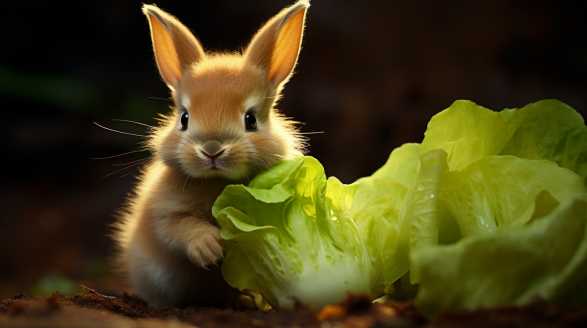
Can Rabbits Eat Butter Lettuce
Introduction Hey there, rabbit lovers! If you’re like me, you adore those adorable furry creatures and want nothing but the best for them. You may be wondering, why butter lettuce? Well, let me tell you, it’s not just for humans to enjoy in salads and sandwiches. we’re going to explore the nutritional benefits of butter […]
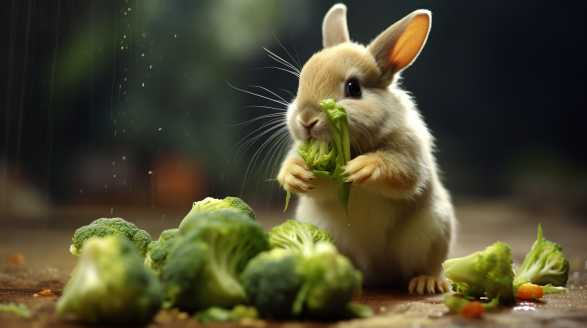
Can Rabbits Eat Brussel Sprouts
Introduction Can Rabbits eat asparagus? Let’s find out.. So let’s dive headfirst into this leafy green adventure together. We’ll explore the abundance of nutrients packed into those miniature cabbages, unravel the potential benefits and risks, and uncover the secrets to safely incorporate Brussel sprouts into your rabbit’s mealtime routine. Get ready for a thrilling ride […]

Can Rabbits Eat Lavender
Introduction Can rabbits eat lavender? Let’s find out Well, brace yourself because it turns out that lavender has some benefits for our little fluffy friends, rabbits! Yes, you heard that right – lavender can actually do wonders for your rabbit’s respiratory health. But hold on a second, let me back up and tell you how […]
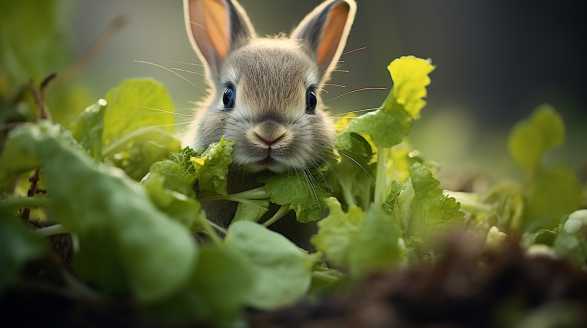
Can Rabbits Eat Spring Mix
Introduction Hey there fellow rabbit lovers! Are you wondering if spring mix is a suitable addition to your fluffy friend’s diet? we’ll be exploring the topic of whether rabbits can eat spring mix and how to safely incorporate it into their diet. We’ll cover everything from the dietary needs of baby rabbits to potential risks […]
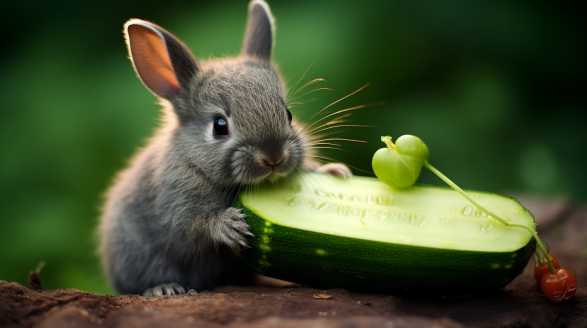
Can Rabbits Eat Zucchini
Introduction Hey there fellow rabbit lovers! Are you ready to dive into the wonderful world of zucchini and its countless benefits for our furry friends? Let’s find out, can rabbits eat zucchini? Imagine a world where your bunny’s fur is softer than ever, their digestion is running smoothly, and their overall health is thriving. Well, […]
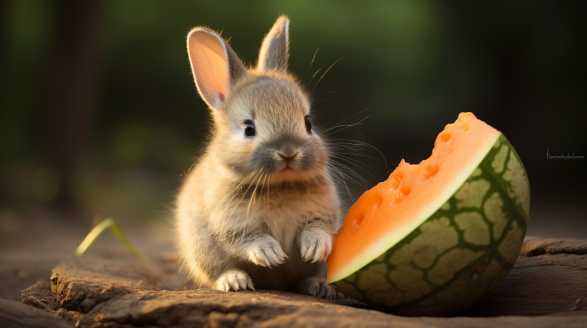
Can Rabbits Eat Cantaloupe
Introduction Can rabbits eat cantaloupe? Let’s find out. Picture this: you’re enjoying a slice of sweet, refreshing cantaloupe on a hot summer day. It’s the epitome of summer delight, and suddenly, you look down to see two curious, twitching noses staring up at you. But wait, is it safe? Can rabbits really enjoy cantaloupe too? […]
